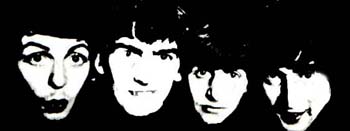![[Metroactive Music]](/gifs/music468.gif)
[ Music Index | North Bay | Metroactive Home | Archives ]
First Fab
Beatles' baby steps captured on new DVD
By Greg Cahill
The recent media onslaught marking the 40th anniversary of the Beatles first stateside TV broadcast mostly overlooked the newly reissued DVD version of the Maysles brothers' extraordinary Fab Four documentary The Beatles: The First U.S. Visit.
And that ain't right.
Originally released in 1992 by MPI Home Video, this classic black-and-white documentary chronicled the pandemonium that surrounded the band's initial stateside tour. It's a candid day-by-day look at the press conferences, hotel rooms and travel junkets. Filmed in cinema verité by award-winning filmmakers Albert and David Maysles (who later went on to film the deadly 1969 Rolling Stones concert at Altamont Speedway featured in Gimme Shelter), this newly expanded two-hour film offers a rare behind-the-scenes look at the group's celebrated arrival on U.S. shores on Pan Am Flight 101.
The documentary now includes 10 songs from their three historic appearances on The Ed Sullivan Show (including the famous Feb. 9, 1964, broadcast, when the mop-topped mods first vaulted into the homes of a record-breaking 73 million viewers), as well as three songs from their debut U.S. concert at the Washington Coliseum. There's also a 51-minute "Making of The Beatles: The First U.S. Visit" extra feature that includes a half-hour of previously unreleased footage shot by the Maysles brothers.
The results are a testimony to the filmmakers' abilities, given their lack of preparation on the project. "I got a call one day from Grenada TV, and they said, 'The Beatles are arriving at Idlewild Airport [now John F. Kennedy Airport] in two hours. Would you like to make a film of them?'" Albert Maysles, now 77, recently told the Hollywood Reporter. "So I put my hand over the phone, and I turned to my brother and said, 'Who are the Beatles? Are they any good?' And he said, 'Oh yeah, they're good.' So we both got on the phone, made a deal and rushed out to the airport.
"We started filming them as they were getting off the plane. The rest is history. We hopped into the limousine with them, and off we went."
Maysles, who recently participated in a panel discussion at a Lincoln Center tribute to the band, spent five days and five nights with virtually unfettered access to the band. The footage first aired that same year as a 40-minute TV special in the United States and Britain. Other segments made their way into the 2000 Beatles Anthology TV series.
Yet even after the media saturation that ensued earlier this month during the recent anniversary coverage, much of the Maysles' footage is fascinating. And not only because it served as a real-life template for the band's 1964 film debut A Hard Day's Night.
There are sequences showing the wide-eyed musicians mugging for the cameras, twisting the night away at the Peppermint Lounge in New York (wow, is that Joey Dee and the Starlighters serenading the boys?) and more than a dozen unabridged performances, all digitally remastered and offered in glorious mono sound. One particularly intriguing scene shows John Lennon kicking back in a hotel room and haltingly playing on a melodica the intro to "Strawberry Fields," a full three years before that psychedelic classic was recorded. Boy geniuses, indeed.
[ North Bay | Metroactive Central | Archives ]
Copyright © Metro Publishing Inc. Maintained by Boulevards New Media.
![]()

We Love You, Yeah, Yeah, Yeah: Neither time, death nor the egregious posturings of Sir Paul can diminsh the Beatles' boyhood genius.
John Lennon, John Lennon/Plastic Ono Band (Capitol/Mobile Fidelity)
John Lennon's 1970 solo debut, released just months after the Beatles' messy break up, is fueled by the singer and songwriter's unbridled angst, unleashed at the time through psychiatric sessions with primal-scream therapy originator Dr. Arthur Janov. Those guttural emotions find their angriest expression in the shrieking "Well, Well, Well," but the album is rife with heartfelt songs of alienation and loss of faith. Lennon's folksy anthem "Working Class Hero" alone would have made this a memorable recording, but this masterwork also contains some of his most personal, and what many still consider his most disturbing, compositions. This newly released 24kt-gold audiophile reissue, from the Sebastopol-based Mobile Fidelity label, includes the three extra tracks and production tweaks incorporated by Yoko Ono in 2000 to the remastered and expanded version. Mobile Fidelity's patented dynamic Ultradisc II process aptly captures the hushed melancholy of "Love" and "Look at Me" as well as the sonic fury of such songs as "I Found Out" and "Remember," which bristle with the Plastic Ono Band's pounding tribal grooves.
--G.C.
From the February 25-March 3, 2004 issue of the North Bay Bohemian.